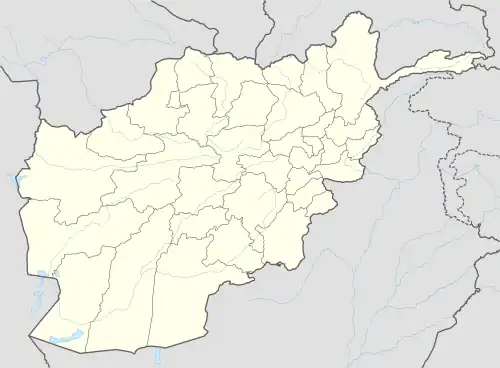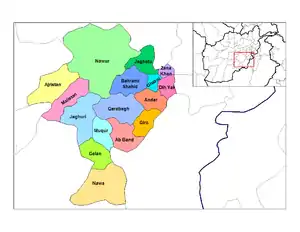Qarabagh
قرهباغ | |
|---|---|
 Qarabagh Location within Afghanistan | |
| Coordinates: 33°11′37″N 68°06′07″E / 33.193665°N 68.102002°E | |
| Country | Afghanistan |
| Province | Ghazni |
| Seat | Qarabagh |
| Area | |
| • Total | 1,800 km2 (700 sq mi) |
| Population (2002)[1] | |
| • Total | 218,000 |

Qarabagh or Qara Bagh (Dari: قرهباغ), is a district in Ghazni province, 56 km to the south-west of Ghazni city in eastern Afghanistan. The 1,800 km2 area is one of the most populated at 109,000; some reports count more than 218,000.[1] The ethnic composition of the district includes Hazaras and Pashtuns.[1] The landscape varies in different parts of the district - deserts in the southwest, plains in the southeast and mountains in the north. The district is seriously affected by drought, especially farming and animal husbandry. Health and education need serious improvement.
Taliban militiamen are active in the area. Their threats have forced the girls' schools in the district to close. They briefly seized the government headquarters at the district centre in the town of Qarabagh in April 2007. The Taliban also seized the Giro district centre southeast of Qarabagh. In July 2007, the Taliban kidnapped 23 Korean aid workers as their bus was hijacked passing through the district on the road between Kabul and Kandahar.
Politics and Governance
The district chief was replaced in 2006 by Zabit Salih Gul after the previous incumbent quit due to frequent threats by the Taliban.[2]
On 22 November 2009 one militant was shot dead in Ali Naizi village in Qarabagh district after an operation by ISAF forces.[3]
Geography
Parts of the inhabited regions of the district are located in the Qolyaqol valley.
Healthcare
Education
Demographics
The two main Hazara groups in the district are Muhammad Khwaja, who tend to live in the center and north of the district, and Chahar-Dasta, who tend to live in the west.[4]
Economy
The area is poor and traditionally one of out-migration to Kabul, Ghazni, Lashkar Gah, and Quetta, as well as to other countries.[4]
The most of the population are depended on agricultural resources.
The economy is largely based on the remittances of the men who work out of the region. Agriculture is mostly based on irrigation, but production is low. Autumn wheat dominates, but spring wheat, barley, potatoes, beans, onions, carrots, turnips and fodder plants are also cultivated. Other crops like almonds, mulberries, apricots, apples and grape may be found in some areas. [4]
Infrastructure
Natural Resources
See also
References
- 1 2 3 "District Profile" (PDF). UNHCR. Archived from the original (PDF) on 27 October 2005. Retrieved 5 November 2015.
- ↑ Reuter Christoph, Borhan Younus. "The Return of the Taliban in Andar District: Ghazni." Decoding the New Taliban: Insights from the Afghan Field. Ed. Antonio Giustozzi. HURST Publications Ltd. 2009.
- ↑ "Operational Update, Nov. 22: Afghan-International Security Forces Kill, Detain Militants in Ghazni, Logar, Kandahar". International Security Assistance Force. 22 November 2009.
- 1 2 3 "QARABAGH (Qarabāḡ), a district (woloswāli) of Ghazni Province in Afghanistan." Encyclopædia Iranica, online edition, New York, 1996-.
External links
- Map of Settlements AIMS, 2002
- Qarabagh District, Ghazni Province (Gazni Province), Afghanistan MinDat.org (mineral data)
